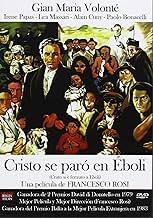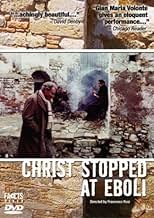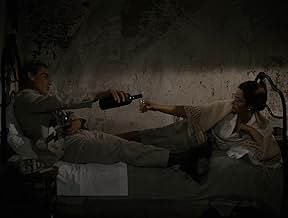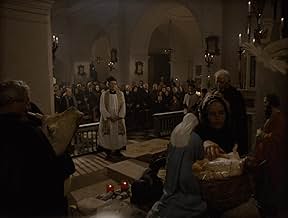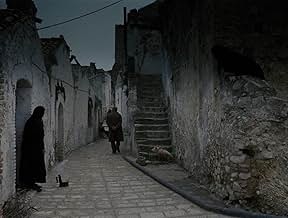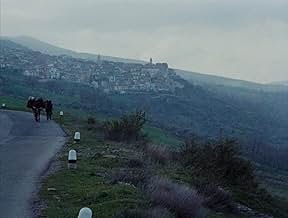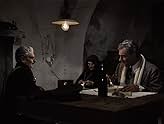VALUTAZIONE IMDb
7,7/10
4417
LA TUA VALUTAZIONE
Un medico nell'Italia fascista viene esiliato in un villaggio remoto per le sue opinioni politiche.Un medico nell'Italia fascista viene esiliato in un villaggio remoto per le sue opinioni politiche.Un medico nell'Italia fascista viene esiliato in un villaggio remoto per le sue opinioni politiche.
- Regia
- Sceneggiatura
- Star
- Ha vinto 1 BAFTA Award
- 7 vittorie e 1 candidatura in totale
Enzo Vitale
- Dottore Milillo
- (as Vincenzo Vitale)
Recensioni in evidenza
I have seen this TV film several times after reading Carlo Levi's book and having been to the Basilicata area in which Levi was exiled.
I consider the film to represent the book's aims which is to show the oppressed state of the peasants in Basilicata, the remoteness and lack of care of central government in Rome and the way in which the fascists could control the local area with very limited support - but of the people who mattered, the mayor, doctor, police. The rest of the populace could be, and were ignored.
A brief nitpicking comment on the title. It comes from something the priest said - on the lines that Christ never reached Aliano but stopped at Eboli some 150 miles distant. Eboli plays no part in Levi's book and the start of the film is wrong in showing him changing trains there, and picking up the stray dog. To get to Matera, where he started his exile he changed in Bari and would not have gone anywhere near Eboli.
I consider the film to represent the book's aims which is to show the oppressed state of the peasants in Basilicata, the remoteness and lack of care of central government in Rome and the way in which the fascists could control the local area with very limited support - but of the people who mattered, the mayor, doctor, police. The rest of the populace could be, and were ignored.
A brief nitpicking comment on the title. It comes from something the priest said - on the lines that Christ never reached Aliano but stopped at Eboli some 150 miles distant. Eboli plays no part in Levi's book and the start of the film is wrong in showing him changing trains there, and picking up the stray dog. To get to Matera, where he started his exile he changed in Bari and would not have gone anywhere near Eboli.
Christ Stopped at Eboli is a captivating film experience (or do we call it a series given its in 4 parts on ah let's not split Southern Italian hairs, shall we now), mostly for how it raises so many ideas and has the time to explore them, though it is so episodic and gradually moving in many ways that it's sort of disappointing that one doesn't connect so much on any kind of emotional level to the men and women and occasional children that Carlo Levi meets and grows closer to and helps as a doctor (and sometimes cannot) over his year in exile as an anti-fascist in 1935 Italy.
There is one conversation that Carlo and the Mayor of this village near Eboli (hence the title), though this mayor speaking tries to do so not as the Mayor vut as a friend, and which stems from a letter Carlo was intending to send out from town to a female friend up North. The letter is telling about how he sees the peasants and townsfolk as not really being this or that but are there own people, and the Mayor Luigi gently but firmly says this isn't so and that the peasants just want more land (and tries to argue that conquering other lands like Italy tried to do in Africa) will accomplish that, and there are other ideas bounced back and forth between the men.
It's possibly one of the times in the film where there's a sense of conflict, and that it is all over the ideas presented - about who the peasants claim to be or who they are and how Fascist ideology spreads and is easy to detect but difficult to eradicate (you can see it right here in America right now, this is where I'd usually say I digress but no, this is a key point), and that one has to really rethink what 'The State' may be as an entity, and if it has to be rethought and changed entirely, to address so many issues that come about with like Nationalism and Pride and that feeling some who have almost nothing that if they, say, go off and fight in a war and come back as a hero it's worth it even at the risk of death, or that othering others and closing ranks with their own is so natural as breathing air, that's what may need to be done.
I may also be including in these observations what Carlo himself comes to understand by the time he's home years later and is talking with other intellectuals who think it's more cut and dry. I really was engaged with these scenes and any time really that Rosi and his writers were having people talk about such things- whether they were these exact conversations in reality or Levi was simplifying things for his book and by proxy the film, I'm pretty sure is the case but can't say for sure- and they are when I leaned forward most to pay attention to the film. I only wish much of the rest of the story/stories, at least for me, engaged me a little more emotionally speaking.
This isn't to say there aren't a couple of characters who have an impact, or at least impress upon Carlo just what life is like in the village: the mother who Carlo stays with (and says she's had 17 pregnancies, and she is really mother and father to all of her children since no one has stayed or have gone to America) and the one Priest who can't seem to reach anyone in the village (they decisively call him a drunk, though is it because they're such crappy people he drinks, one wonders) who Carlo also connects with somewhat, are two such examples. Other times there are some charming and interesting scenes where characters speak on their superstitions and other such issues, and there are some gorgeous shots of the landscapes and scenery (one should say it's due to the skill with finding the right light and tones for DP De Santis that it is so, not just what it is) and the musical score by Piccioni is lovely.
While Carlo does become certainly by episode 4 so emeshed in the community (it helps he has a pretty good track record as a non-practicing but well-learned doctor in a place where the only other medical help sucks, leave to being the Luke Wilson in Idiocracy effect one supposes, now I do digress), it doesn't mean we get a sense that Carlo has grown close particularly with any one person really. This has a pretty terrific reputation, so I looked at some of the less charitable reviews of the film and, putting aside the "it's boring" takes which don't help much, it did ring perhaps more true than not for me that the film does stand at a place (and I don't know if this is the case with the book since that's another medium altogether) where it is at an intellectual high ground, in other words the sort of peasants this is about... would they sit and watch a film like Christ Stopped at Eboli, or is it for us cineastes and art-house film buffs to sit and chew over?
I think Christ Stopped at Eboli benefits most of all if nothing else from being (I hate this coopted dumb phrase but I'll use it anyway) fair and balanced look at how someone who has his own ideas about society and fascism and anti-fasicsm is ironically put into instead of a prison and exile situation where he has to see how "they" live. I think after years of like the NY Times style pieces of "What do the people in diners *really* think" when it comes to looking at "them" and political leaders which are often not genuine, it is good to see a work of art that does try to look at people like this simply and plainly and, through a POV actor as gifted and compelling like Volante when largely listening and observing.
I just wish I felt more shaken on a more profound level by the sense of something more... poetic, perhaps (as a useful comparison, Tree with Wooden Clogs, which I thought this might more resemble, comes to mind). It is beautiful and well made, and yet it is like going to and having a really gigantic mutli-course meal at a restaurant, you'll remember to leave a nice tip and a good rating online, but will one come back to it? Hmm. 7.5/10.
There is one conversation that Carlo and the Mayor of this village near Eboli (hence the title), though this mayor speaking tries to do so not as the Mayor vut as a friend, and which stems from a letter Carlo was intending to send out from town to a female friend up North. The letter is telling about how he sees the peasants and townsfolk as not really being this or that but are there own people, and the Mayor Luigi gently but firmly says this isn't so and that the peasants just want more land (and tries to argue that conquering other lands like Italy tried to do in Africa) will accomplish that, and there are other ideas bounced back and forth between the men.
It's possibly one of the times in the film where there's a sense of conflict, and that it is all over the ideas presented - about who the peasants claim to be or who they are and how Fascist ideology spreads and is easy to detect but difficult to eradicate (you can see it right here in America right now, this is where I'd usually say I digress but no, this is a key point), and that one has to really rethink what 'The State' may be as an entity, and if it has to be rethought and changed entirely, to address so many issues that come about with like Nationalism and Pride and that feeling some who have almost nothing that if they, say, go off and fight in a war and come back as a hero it's worth it even at the risk of death, or that othering others and closing ranks with their own is so natural as breathing air, that's what may need to be done.
I may also be including in these observations what Carlo himself comes to understand by the time he's home years later and is talking with other intellectuals who think it's more cut and dry. I really was engaged with these scenes and any time really that Rosi and his writers were having people talk about such things- whether they were these exact conversations in reality or Levi was simplifying things for his book and by proxy the film, I'm pretty sure is the case but can't say for sure- and they are when I leaned forward most to pay attention to the film. I only wish much of the rest of the story/stories, at least for me, engaged me a little more emotionally speaking.
This isn't to say there aren't a couple of characters who have an impact, or at least impress upon Carlo just what life is like in the village: the mother who Carlo stays with (and says she's had 17 pregnancies, and she is really mother and father to all of her children since no one has stayed or have gone to America) and the one Priest who can't seem to reach anyone in the village (they decisively call him a drunk, though is it because they're such crappy people he drinks, one wonders) who Carlo also connects with somewhat, are two such examples. Other times there are some charming and interesting scenes where characters speak on their superstitions and other such issues, and there are some gorgeous shots of the landscapes and scenery (one should say it's due to the skill with finding the right light and tones for DP De Santis that it is so, not just what it is) and the musical score by Piccioni is lovely.
While Carlo does become certainly by episode 4 so emeshed in the community (it helps he has a pretty good track record as a non-practicing but well-learned doctor in a place where the only other medical help sucks, leave to being the Luke Wilson in Idiocracy effect one supposes, now I do digress), it doesn't mean we get a sense that Carlo has grown close particularly with any one person really. This has a pretty terrific reputation, so I looked at some of the less charitable reviews of the film and, putting aside the "it's boring" takes which don't help much, it did ring perhaps more true than not for me that the film does stand at a place (and I don't know if this is the case with the book since that's another medium altogether) where it is at an intellectual high ground, in other words the sort of peasants this is about... would they sit and watch a film like Christ Stopped at Eboli, or is it for us cineastes and art-house film buffs to sit and chew over?
I think Christ Stopped at Eboli benefits most of all if nothing else from being (I hate this coopted dumb phrase but I'll use it anyway) fair and balanced look at how someone who has his own ideas about society and fascism and anti-fasicsm is ironically put into instead of a prison and exile situation where he has to see how "they" live. I think after years of like the NY Times style pieces of "What do the people in diners *really* think" when it comes to looking at "them" and political leaders which are often not genuine, it is good to see a work of art that does try to look at people like this simply and plainly and, through a POV actor as gifted and compelling like Volante when largely listening and observing.
I just wish I felt more shaken on a more profound level by the sense of something more... poetic, perhaps (as a useful comparison, Tree with Wooden Clogs, which I thought this might more resemble, comes to mind). It is beautiful and well made, and yet it is like going to and having a really gigantic mutli-course meal at a restaurant, you'll remember to leave a nice tip and a good rating online, but will one come back to it? Hmm. 7.5/10.
This dutiful, detailed three-and-a-half TV epic describes the exile of dissident intellectual Carlo Levi in a remote village of fascist Italy, blighted by poverty, disease, immirgration and governmental contempt. The film is part-character study, part-socio-historico-political analysis, part careful representation of a people and its place. It is seriously flawed (the people are sentimentalised, the politics are simplistic, the pleasant presentation (music, major actors, cinematography etc.) works against the horrifiic subject matter); but there are nice ironies too, such as the Christlike Levi capable of the fascism he deplores.
The film can be seen in two contexts, as a neo-realist riposte to the prominent anti-realist 70s films about Fascism ('The Spider's Strategem', 'The Conformist', 'Amarcord'), and as a prestigious historical epic on a national theme frequent in the 70s and 80s ('The Travelling Players', 'Heimat'). In both cases it falls short.
The film can be seen in two contexts, as a neo-realist riposte to the prominent anti-realist 70s films about Fascism ('The Spider's Strategem', 'The Conformist', 'Amarcord'), and as a prestigious historical epic on a national theme frequent in the 70s and 80s ('The Travelling Players', 'Heimat'). In both cases it falls short.
The transposition of Levi's autobiographical novel can recreate with effectiveness the atmosphere of absolute immobilism out of the history on which the novel really insists. Basilicata's and Southern Italy's setting helps to find a place absolutely uncontaminated by the modernity and the recent history. We wear the dresses of main character that works as a modern sonde in an anti-modern world: in this dimension we see all the contradictions of fascist Italy (of Italy tout court), divided by languages and geographies, where fight the fascism's rhetoric paroxysm against a world deaf to every modern rhythm. The farmer's world is a world based on the slow and circular rhythm of the nature, still impregnated with the sense of the superstitious of the events and of a mythology more ingrained than every fascist super-action.
The sedate interpretation of Volonté contributes to the assumption of a point of view curious, sensible, that can find the deep reasons of the presence of two (or more) Italies and reveal so easy and silent abuses that the potestà and others can carry on on farmers' shoulder. But the main strength of the movie is in a luminous and montalian photography, in a sensual and no overload pittoricism that makes a chromatic and geometric spectacle every single frame.
The sedate interpretation of Volonté contributes to the assumption of a point of view curious, sensible, that can find the deep reasons of the presence of two (or more) Italies and reveal so easy and silent abuses that the potestà and others can carry on on farmers' shoulder. But the main strength of the movie is in a luminous and montalian photography, in a sensual and no overload pittoricism that makes a chromatic and geometric spectacle every single frame.
"Christ stopped at Eboli" (or in Italian "Cristo si e fermato a Eboli") is a rather hard to find movie. The theatrical release is about 2,5 hours long, but I saw the TV movie, that is nearly an hour longer.
The movie is about the banishment of narrator Carlo Levi in 1935 - 1936. Levi was a left wing intellectual and critic of Italian dictator Benito Mussolini.
The story is situated during the war between Italy and Abyssinia (todays Ethiopia), so before the Second World War.
In spite of the title, the movie is neither about Christ nor about Eboli.
Not about Eboli because the train station of Eboli is only a stopover in the journey of Levi to his banishment location of Grassano and Luciano, two small villages in the Southern region of Lucania (today Basilicata).
Not about Christ because in the remote villages of Grassano and Lucania the Roman Catholic faith is only a surface below which ancient pagan beliefs still lives on.
In his banishment location Levi enjoys a great deal of freedom. Mussolini is more concerned with getting rid of him in the political discourse than to punish him. At the beginning Levi is first of all an observing outsider but gradually he integrates with the local community, in no small measure thanks to his medical knowledge.
"Christ stopped at Eboli" is a film about the wealth difference between North- and South Italy. Levi encounters instances of malaria in his banishment location. Many citizens try to flee the poverty by emigrating to the United States. The "emotional distance" to New York seems almost shorter than to Rome.
But "Christ stopped at Eboli" is in particular a film about the mixture of Christianity and pagan beliefs. In many instances we see this combination in horror like movies (compare "The wicker man", 1973, Robin Hardy) but in "Christ stopped at Eboli" it is used to full effect in a social drama.
The film is above all a slow movie, in the good sense of the word. The central theme is the gradual integration of he main character in the local community, "gradual" being the essential word in this sentence.
Francesco Rosi is not a very well known director. He is of the same generation as the more popular Taviani brothers. "Christ stopped at Eboli" has also some resemblance with some Taviani movies, situated as it is in the poor South. I am thinking of "Padre Padrone" (1977) in particular. Compared with "Christ stopped at Eboli" "Padre Padrone" is however nearly an action movie.
The movie is about the banishment of narrator Carlo Levi in 1935 - 1936. Levi was a left wing intellectual and critic of Italian dictator Benito Mussolini.
The story is situated during the war between Italy and Abyssinia (todays Ethiopia), so before the Second World War.
In spite of the title, the movie is neither about Christ nor about Eboli.
Not about Eboli because the train station of Eboli is only a stopover in the journey of Levi to his banishment location of Grassano and Luciano, two small villages in the Southern region of Lucania (today Basilicata).
Not about Christ because in the remote villages of Grassano and Lucania the Roman Catholic faith is only a surface below which ancient pagan beliefs still lives on.
In his banishment location Levi enjoys a great deal of freedom. Mussolini is more concerned with getting rid of him in the political discourse than to punish him. At the beginning Levi is first of all an observing outsider but gradually he integrates with the local community, in no small measure thanks to his medical knowledge.
"Christ stopped at Eboli" is a film about the wealth difference between North- and South Italy. Levi encounters instances of malaria in his banishment location. Many citizens try to flee the poverty by emigrating to the United States. The "emotional distance" to New York seems almost shorter than to Rome.
But "Christ stopped at Eboli" is in particular a film about the mixture of Christianity and pagan beliefs. In many instances we see this combination in horror like movies (compare "The wicker man", 1973, Robin Hardy) but in "Christ stopped at Eboli" it is used to full effect in a social drama.
The film is above all a slow movie, in the good sense of the word. The central theme is the gradual integration of he main character in the local community, "gradual" being the essential word in this sentence.
Francesco Rosi is not a very well known director. He is of the same generation as the more popular Taviani brothers. "Christ stopped at Eboli" has also some resemblance with some Taviani movies, situated as it is in the poor South. I am thinking of "Padre Padrone" (1977) in particular. Compared with "Christ stopped at Eboli" "Padre Padrone" is however nearly an action movie.
Lo sapevi?
- QuizThe title of the film and its source novel comes from an expression by the people of Gagliano who say of themselves, "Christ stopped short of here, at Eboli" which means, in effect, that they feel they have been bypassed by Christianity, by morality, by history itself-that they have somehow been excluded from the full human experience.
- BlooperOn the bus, the way Carlo holds the dog changes.
- Citazioni
Luisa Levi: You'd need a woman here.
Carlo Levi: Yes, I would. But it's not easy.
Luisa Levi: Come on, don't exaggerate. Don't tell me that here even finding a cleaning lady is impossible.
Carlo Levi: Here a woman wouldn't go in the house of a single man. Just spending time together implies sleeping together.
Luisa Levi: You can't be serious.
Carlo Levi: Oh, yes I am.
- Versioni alternativeThere are many versions ranging from 120 minutes to 222 minutes. The longest version available in the U.S. is 222 minutes and is available from the Criterion Collection on Blu-ray.
- ConnessioniFeatured in Il cineasta e il labirinto (2004)
I più visti
Accedi per valutare e creare un elenco di titoli salvati per ottenere consigli personalizzati
- How long is Christ Stopped at Eboli?Powered by Alexa
Dettagli
- Data di uscita
- Paesi di origine
- Sito ufficiale
- Lingua
- Celebre anche come
- Christ Stopped at Eboli
- Luoghi delle riprese
- Aliano, Matera, Basilicata, Italia(second house where Levi lives)
- Aziende produttrici
- Vedi altri crediti dell’azienda su IMDbPro
Botteghino
- Lordo Stati Uniti e Canada
- 78.736 USD
- Fine settimana di apertura Stati Uniti e Canada
- 9006 USD
- 7 apr 2019
- Lordo in tutto il mondo
- 78.736 USD
Contribuisci a questa pagina
Suggerisci una modifica o aggiungi i contenuti mancanti



